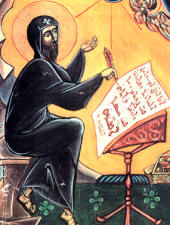St. Ephrem
St. Ephrem
Ephrem was of Syrian descent and son of a citizen of Nisibis. While yet a young man be betook himself to the holy bishop James, by whom he was baptized, and he soon made such progress in holiness and learning as to be appointed master in the school of Nisibis in Mesopotamia. After the death of the bishop James, Nisibis was captured by the Persians, and Ephrem went to Edessa, where he settled first among the monks in the mountains. Later, to avoid the company of those who flocked to him, he adopted the eremitical life. He was made deacon of the church of Edessa, but refused the priesthood out of humility. He was rich in all virtues and strove to acquire piety and religion by the following of true wisdom. He placed all his hope in God, despised all human and transitory things, and was ever filled with the earnest desire of those which are divine and eternal.
 He was led by the Spirit of God to Caesarea in Cappadocia, where he saw Basil, the mouthpiece of the Church, and they obtained benefit from their mutual intercourse. In order to refute the many errors which troubled the Church at that time, and to expound the mysteries of Jesus Christ, he wrote many books in the Syrian tongue, almost all of which have been translated into Greek. St. Jerome bears witness that he attained such fame that his writings were read publicly in the churches after the reading from the Holy Scriptures.
He was led by the Spirit of God to Caesarea in Cappadocia, where he saw Basil, the mouthpiece of the Church, and they obtained benefit from their mutual intercourse. In order to refute the many errors which troubled the Church at that time, and to expound the mysteries of Jesus Christ, he wrote many books in the Syrian tongue, almost all of which have been translated into Greek. St. Jerome bears witness that he attained such fame that his writings were read publicly in the churches after the reading from the Holy Scriptures.
On account of his works, so full of the light of heavenly doctrine, he was greatly honored even during his lifetime as a Doctor of the Church. He composed a poem in praise of the Blessed Virgin Mary and the saints for which he was called by the Syrians “the Harp of the Holy Ghost.” He was noted for his great and tender devotion towards the immaculate Virgin. He died, rich in merits, at Edessa in Mesopotamia, on the fourteenth of the Kalends of July, in the reign of Valens. Pope Benedict XV, at the instance of many Cardinals of the Holy Roman Church, patriarchs, archbishops, bishops, abbots and religious communities, declared him by a decree of the Sacred Congregation of Rites to be a Doctor of the Universal Church.
Excerpted from The Liturgical Year, Abbot Gueranger O.S.B.
Patron: Spiritual directors; spiritual leaders.
Symbols: cowl with small cross; pillar of light; scourge.
Often portrayed: In monastic habit; lying on a funeral slab; with a scroll and vine, as a deacon.
Things to Do:
- Learn more about St. Ephrem here.
- Read some of the writings of St. Ephrem.
- Read Pope Benedict XV’s Encyclical on St. Ephrem.
From CatholicCulture.org